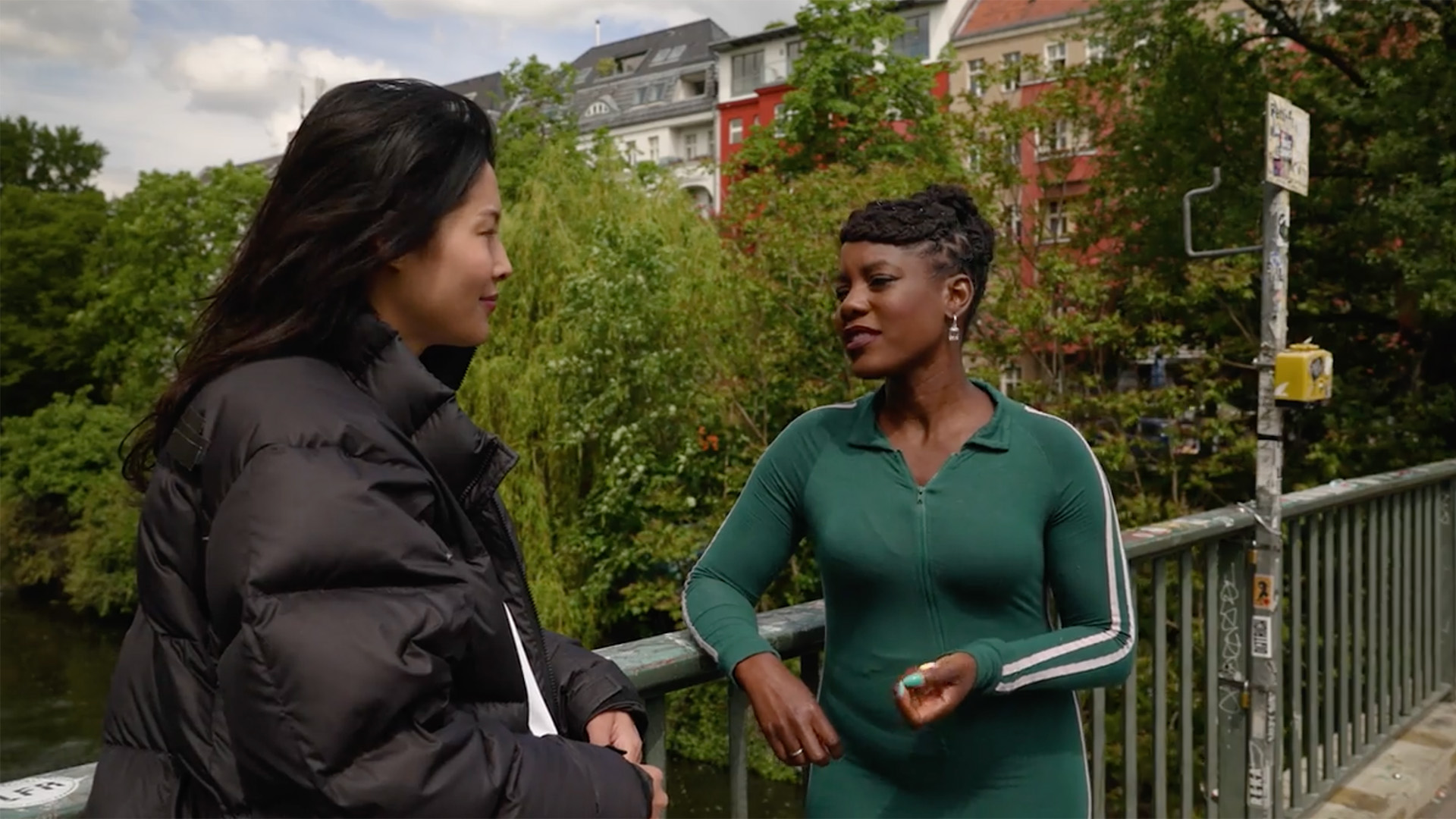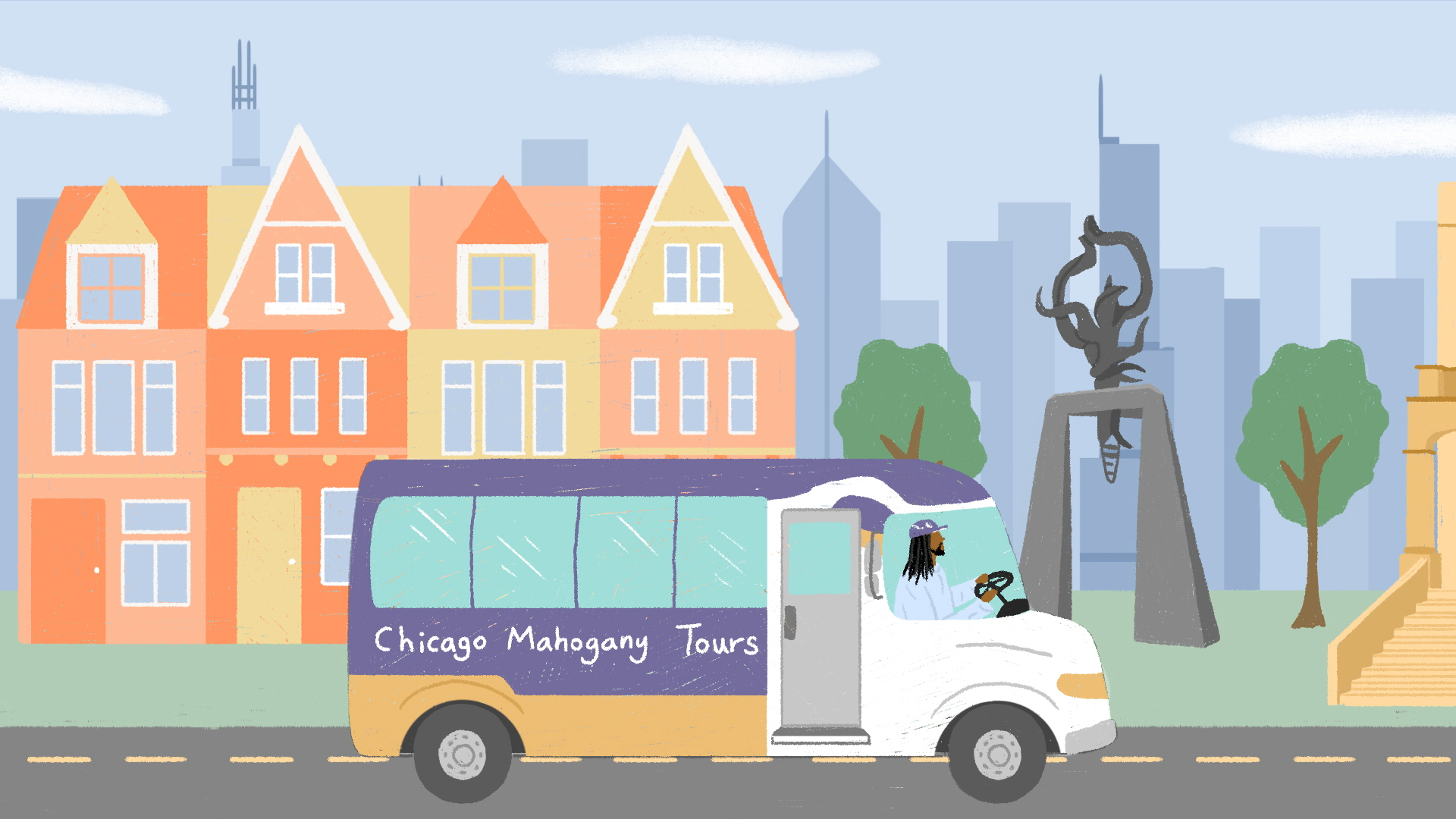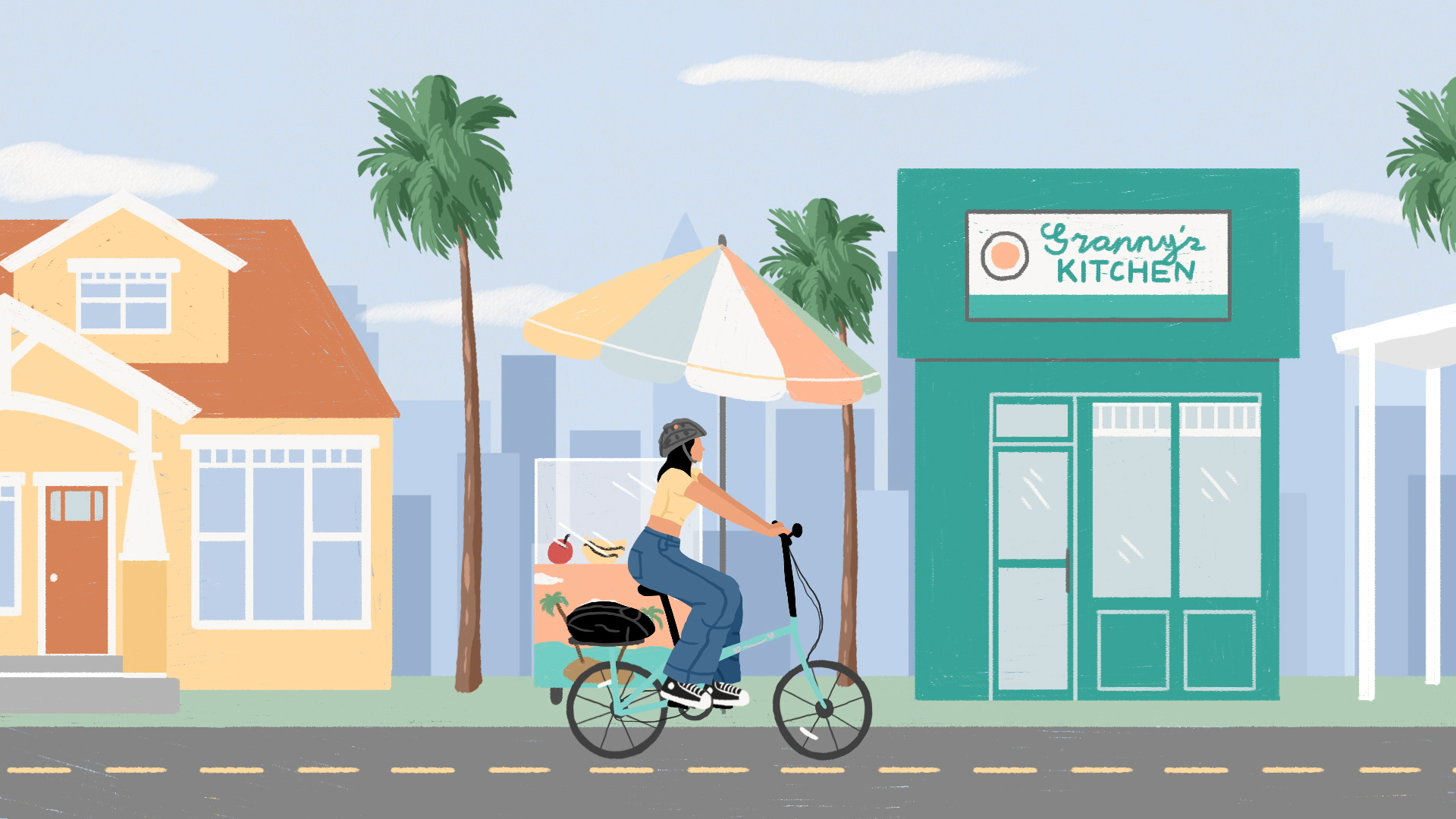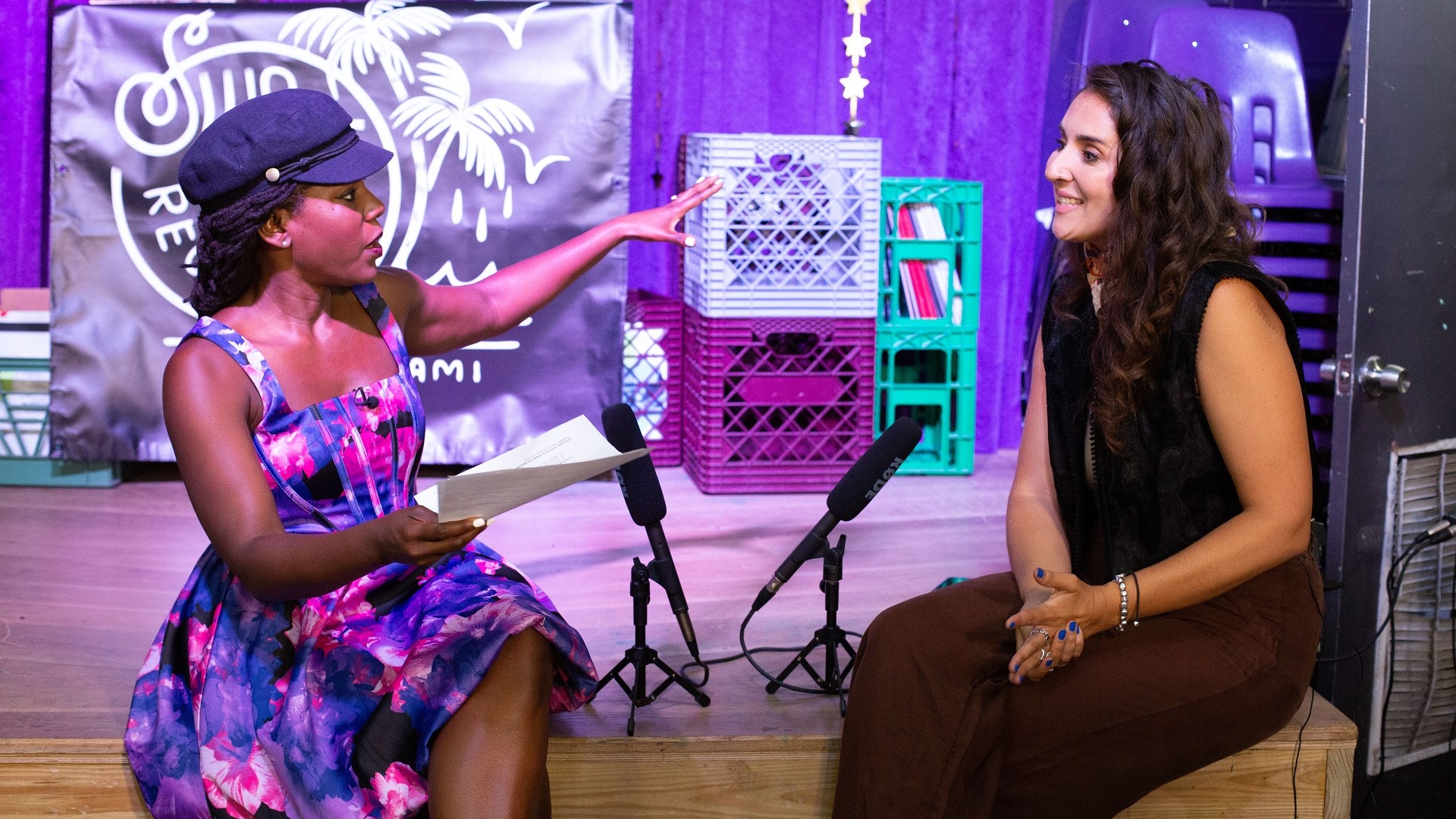
Oneika and Isabella talk Little River, Miami music on the Sweat Records stage. (Photo: Rachael Blair)
About the JourneyLittle River, Miami: Go Beyond the Beach to Uncover the City’s Dynamic Latin Music Scene
By Oneika RaymondOneika Raymond heads to Little River, Miami, a creative hub north of downtown and across the bay from Miami Beach. There, she’s joined by local entrepreneur Isabella “Izzy” Acker for a driving tour of the area where Isabella launched Tigre Sounds, a global music discovery platform with a focus on Latin artists. Through it, Isabella hosts live Tigre Sessions, or music events in lesser-known neighborhoods and venues across the city.
Oneika meets up with Isabella at Sweat Records, an independent record store in Little Haiti and a go-to location for music lovers. Oneika has recently moved to Miami and made it her home base, so she’s excited to hop in the car with Isabella to get a feel for a trio of neighborhoods that are new to her: Little Haiti, Little River, and Miami Modern, or MiMo for short. They’re all within a five-minute drive of each other, and home to an exciting creative community of artists, musicians, and entrepreneurs.
Oneika and Isabella set off on a driving tour up Little Haiti’s main corridor, Northeast 2nd Avenue. Along the way, Isabella points out mainstays like the Little Haiti Cultural Center, Chef Creole, and the B&M Market. From there, they venture into Little River, where the buildings begin to look more industrial and Isabella shares tips for different music venues to check out, like Understory and Helmet One.
The final neighborhood in the tour is MiMo, an area along Biscayne Boulevard known for its unique style of architecture featuring curved walls, modern angles, and geometric patterns. You’ll find all sorts of fusion restaurants on the thoroughfare as well, including Luna Pasta e Dolci, an Argentine-Italian restaurant which boasts some of the tastiest empanadas in the city.
Oneika and Isabella grab a bite at Caracas Bakery, a Venezuelan owned and French-inspired café serving up pastries and coffee with a Venezuelan twist. There, they reflect on the diversity of the neighborhood and the importance of supporting local businesses.
They end the day by sitting down to discuss how Isabella is committed to doing her part to build experiences beyond Miami’s beaches that both locals and visitors can enjoy – and why live music and supporting Latin artists is such a big part of that commitment.
They talk about the present and the future of the Latin music scene in Miami, the live music venues to support across the city, and how Isabella is raising awareness for Latin music in Miami and beyond through Tigre Sounds.
To read full episode transcripts from About the Journey and see photos of each featured destination, head to About the Journey on Marriott Bonvoy Traveler. Starting this season, you can also watch videos from select episodes on our Marriott Bonvoy YouTube channel.
PODCAST TRANSCRIPT
Oneika Raymond: Miami neophyte.
Isabella Acker: Yes.
Oneika Raymond: I am completely new. I just learned about Little Haiti.
Isabella Acker: Yes.
Oneika Raymond: Now I’ve come to find out that there’s another neighborhood called Little River.
Isabella Acker: Yes, welcome.
Oneika Raymond: That’s precisely it. So I’m still trying to navigate what it means to be considered, or how I can get my badge of honor as a Miami local.
Isabella Acker: I do feel like understanding the neighborhoods is such an important part of knowing beyond what everybody thinks Miami is.
Oneika Raymond: Yeah, totally, exactly.
Oneika Raymond: Welcome to About the Journey. I’m your host, Oneika Raymond, a travel journalist and member of Marriott Bonvoy.
This season, I’m uncovering the lesser known sides of six iconic cities. In my years of travel, I’ve found there is no better way to see a city than through its neighborhoods and the people who call them home. So I’ll be meeting up with in-the-know locals to show me what makes their homes one-of-a-kind: from the sights, sounds and flavors to the hidden gems, and *so much more.*
This week, we’re in Miami, Florida — exploring beyond the beaches and learning about the Latin music scene.
Beatriz Ayala: I love Little River. There’s so much culture. So much innovation happening in such a small part of the city.
Isabella Acker: So much of Miami is like ask the questions, right? And then the thing leads you to another breadcrumb to give you a deeper, richer understanding of your experience with it.
Oneika Raymond: I recently made Miami my home base. And while I’m loving it so far, I’m still learning about the city, and how to make it my own.
So for this episode, we’re doing something a little different. Rather than sticking to just one neighborhood, I’m going to get to know a few by diving into the world of Miami music. And I’m going to do it with the help of local entrepreneur Isabella Acker.
Isabella Acker: I’m Izzy, ah, I’ve been in the music scene for the last decade here in Miami, a transplant from Atlanta. It took me some time to find my space, my community, like what Miami meant and is for me, and I found it in the music scene.
Oneika Raymond: Isabella, or Izzy for short, is the founder of Tigre Sounds, a music discovery platform with a focus on Latin artists. She’s deeply passionate about showing visitors the parts of Miami that they might not otherwise stumble upon, and she does so through hosting live music events in lesser-known neighborhoods and venues across the city.
Isabella Acker: To me, like it’s really not about putting up one artist and blowing them up. It’s about our whole scene, right? And so you have to work with the local community, with the local record store, with the promoter. To be able to really create something that’s bigger than you, you have to work in community. And I’ve just always been very passionate about it. That’s the truth.
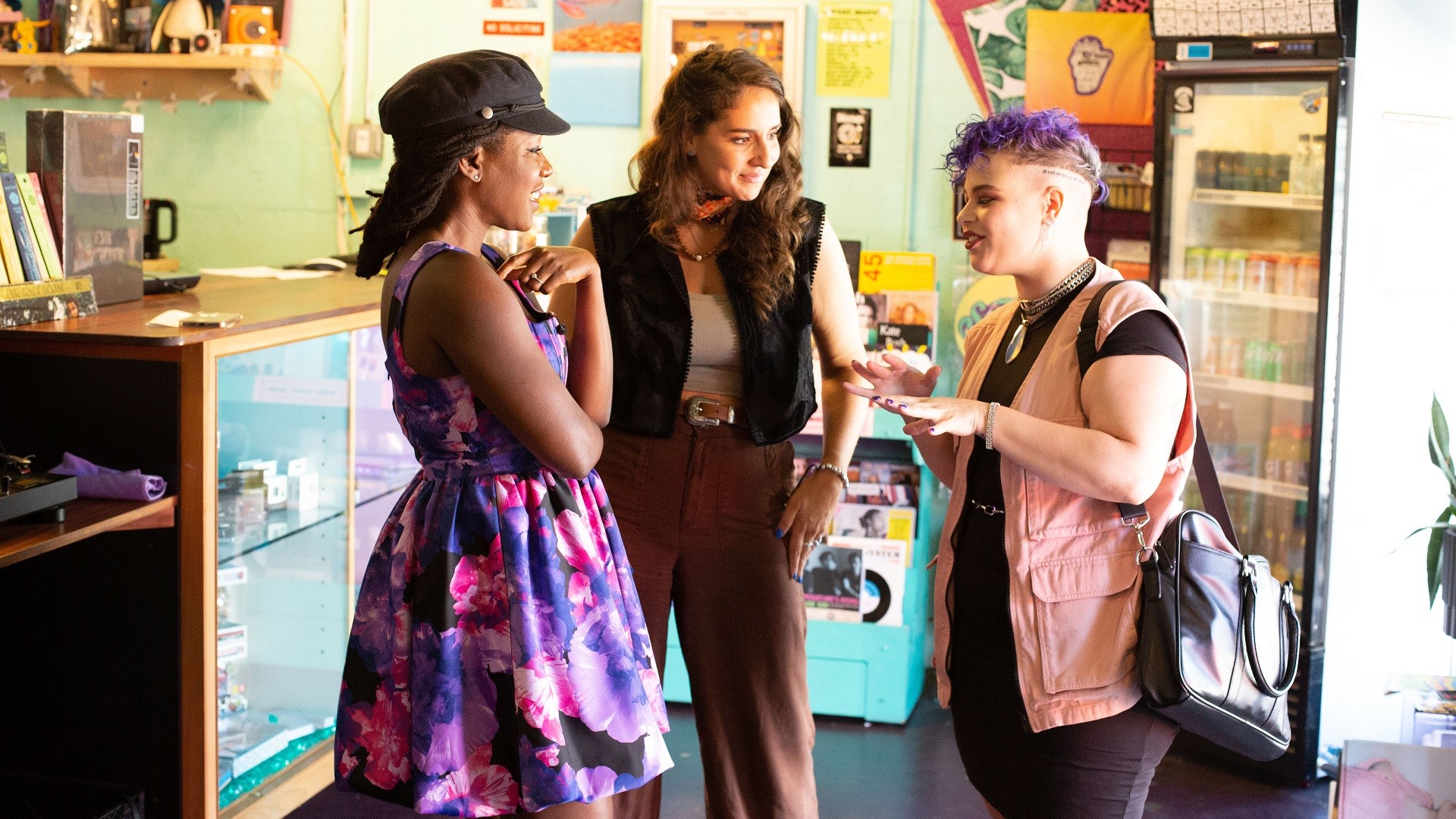
Oneika Raymond: We met up at Sweat Records in Little Haiti, a neighborhood five miles north of downtown. It’s on the mainland, across the bay from Miami Beach. You can’t miss the indie record store on Northeast 2nd Avenue. Its exterior is adorned by the “wall of idolatry,” a larger than life mural depicting portraits of musicians in various hues of purple.
Isabella Acker: So, Sweat Records, it’s just been such a mecca of the music scene. I feel like when you want to go to cities and understand what’s going on musically, culturally, going to a record store really has just a deeper, richer connection to the city.
Oneika Raymond: There’s two words that you’ve mentioned that really stick out to me. Okay. And those two words are culture and connection.
Isabella Acker: Yep.
Oneika Raymond: And geographically, we’re actually in the neighborhood of Little Haiti.
Isabella Acker: Yeah, that’s right.
Oneika Raymond: And I think that’s probably the fundamental issue when it comes to Miami in general…
Isabella Acker: Yeah.
Oneika Raymond: Is that you don’t hear about neighborhoods like Little Haiti with consistency, not in the same way that people are going to talk about South Beach.
Isabella Acker: I think it’s because you have to choose to venture out, right? You’re not gonna see the big red buses here that go to Little Havana and go to Wynwood. So you have to really do your research and kind of understand like, what does 24 hours in this neighborhood look like to me?
Oneika Raymond: This podcast, About the Journey, is obviously about people’s journeys, but also the neighborhoods and the spaces, that they find themselves in that shape these journeys.
Isabella Acker: Sure. So I was actually gonna say a lot of locals and visitors don’t really know where the corridors begin and end with neighborhoods like Little Haiti, Little River and MiMo. But everything is five, 10 minutes away from each other. It has really become such a hub for creative entrepreneurs.
Oneika Raymond: Izzy offers to take me on a short driving tour of this creative hub set back from the bay. We climb into her car, blast the AC, and drive up Northeast 2nd Avenue, Little Haiti’s main corridor, as Izzy points out mainstays of the neighborhood.
Isabella Acker: You’ll find the Little Haiti cultural complex, the Caribbean marketplace, Chef Creole, Chez Le Bebe and the B&M market, some of the best spots in the neighborhood.
Oneika Raymond: Influenced by the Haitian diaspora since the mid 20th century, the buildings are unique here. They’re painted in bright colors and finished with ornamental, lace-like trim.
Oneika Raymond: So tell me about Little River then. So Little River is part of Little Haiti or…
Isabella Acker: So no, it’s different areas. Little Haiti, it takes you all the way up to the 71st street approximately and you go up to Northwest Second Ave, where you’ll find the main corridor to Little River.
Oneika Raymond: So something I find really interesting as we’re driving through these streets. I would not know I was in Miami.
Isabella Acker: Right.
Oneika Raymond: There are very few palm trees, first of all. I don’t see any water. And the buildings look quite industrial.
Isabella Acker: Yep. They have, you know, flex use space and different warehouses, multi-use…there’s co-working, there’s, you know, art galleries and I think that’s exactly why it’s had this burgeoning opportunity for creativity. And that was the bright line that just passed…
Oneika Raymond: Yeah.
Isabella Acker: A high speed train from Miami, Palm Beaches and Orlando.
Oneika Raymond: Hmm.
Oneika Raymond: Little River is Izzy’s go-to neighborhood for building opportunity and community. Between its welcoming energy and more spacious layout, there’s room to grow.
Isabella Acker: You know, I think as a local, Miami can feel very hectic. You’re just natural day to day. So it feels nice to be in a more neighborhood-centric place that you can feel like you’re a little more at home.
Oneika Raymond: Little River is where she launched Tigre Sounds — and where new venues are supporting live music and opportunities to gather.
Isabella Acker: A recent venue that’s opened in the last few years, it’s called Understory, they have an amazing monthly called, The Rhythm Portal, a production from CC Conex, from Argentina, from Buenos Aires. I would recommend it to anybody that’s looking to do something a little more off the beaten path.
There’s a cool kind of motorcycle community hub, called Helmet One where they’ve been doing DJ sets, acoustic sessions. I would also say Little River hosts some really cool events like the Little River Flea, and you can always just expect some good vibes, good tunes, and meet some good people.
Oneika Raymond: We leave Little River and venture toward Biscayne Boulevard.
Isabella Acker: So now, we’re gonna be coming into the MiMo district, the Miami Modern Architecture neighborhood.
Oneika Raymond: While Miami Beach is known for its colorful pre-war Art Deco buildings, Miami Modern is all about curved walls, modern angles and geometric patterns. The more you look for the style, the more you see it. The same can be said for restaurants as we drive up Biscayne Boulevard.
Isabella Acker: I love the Uptown 66 Taqueria, really yummy Mexican. The farmer’s market happens here is the Upper Legions farmer’s Market.
Oneika Raymond: Very cool.
Isabella Acker: On Saturdays, and they do a really wonderful yoga class.
Oneika Raymond: I think I’ve been here!
Isabella Acker: Yeah. You have? Okay.
Oneika Raymond: Yes!
Isabella Acker: There’s just a little bit of everything. Mm-hmm. One of my favorite Italian restaurants and empanadas cuz they’re Argentine-Italian.
Oneika Raymond: Hmm.
Isabella Acker: I mean, I would be so bold to say the best empanadas in Miami. It’s a family-owned restaurant. It’s called Luna Pasta e Dolce.
Oneika Raymond: Ooh. That is good to know.
Isabella Acker: Exactly.
Oneika Raymond: Just as Izzy had promised, our driving tour is complete in 15 minutes, and ends just in time for a quick coffee break. Izzy’s brought me to Caracas Bakery in MiMo, one of the go-to lunch spots during the work week.
Oneika Raymond: And Caracas, obviously is Venezuelan…the capital of Venezuela.
Isabella Acker: Yeah.
Oneika Raymond: So is there, is there like Latin inspired cuisine?
Isabella Acker: Yeah. I mean, they have a fusion, but um, yeah, they make everything in house and it’s like a really amazing, delicious local joint.
Oneika Raymond: Mm. Can’t wait.
Oneika Raymond: Caracas offers French pastries with a Venezuelan twist. Owned by a father-son team, the family relocated from Venezuela to South Florida in 2014. Their version of the cachito — a ham and cheese stuffed pastry isn’t to be missed.
Oneika Raymond: So, one of the things that I noticed when we were driving up here is how multicultural it is. You pointed out Venezuelan, Greek, Argentinian, Vietnamese. I mean, there are a lot of different cultures represented here. And to that point, Caracas is actually a Venezuelan-French bakery. So, I guess my question to you is, why is it important to you, to support these sorts of ventures.
Isabella Acker: I mean to me this is such a fabric of what is Miami, right? You support with your dollar, you know? And so, I think supporting local is a really important part of picking the kind of experience you wanna have in your city.
Oneika Raymond: As an entrepreneur, Izzy is committed to doing her part to build experiences beyond the beach that both locals and visitors can enjoy. How she talks about supporting local restaurants like Caracas Bakery is exactly how she talks about supporting emerging Latin musicians here.
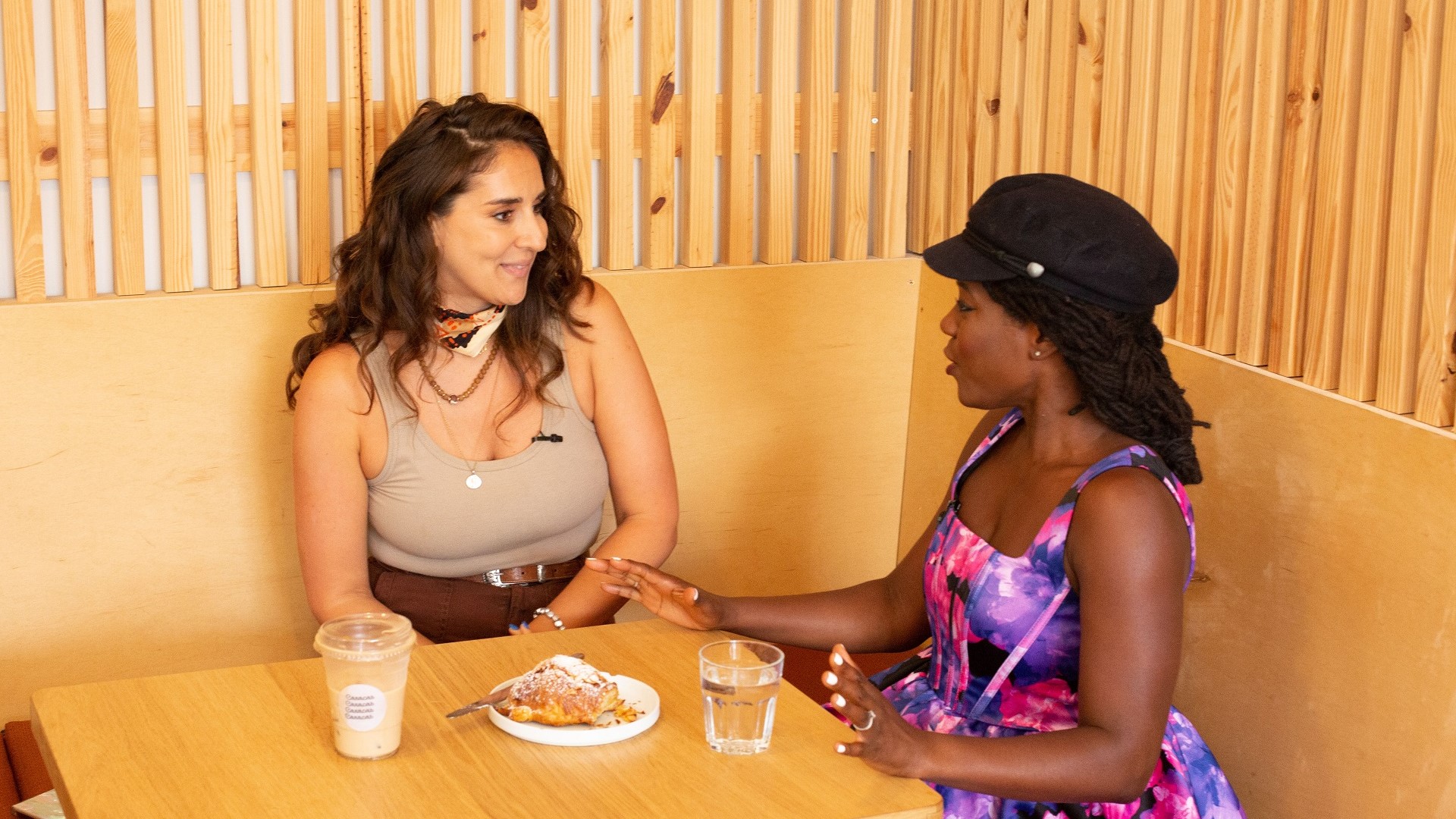
And in this way, Izzy is helping to expand people’s perception of what Miami has to offer. It’s a vision of the city that she shared with me back at Sweat Records.
Isabella Acker: You know, Miami has this, this appeal and this charm that you’re drawn in. I think, originally I came for, for school, and I decided to stay because I saw Miami to be really entrepreneurial. I’m also, you know, a citizen of the world. I grew up in a household speaking Spanish. And I feel like with Miami it has a lot of people, that second generation, so many, you know, transplants. And it felt to me that’s my story now. And I felt really identified with that.
Oneika Raymond: And that’s something that we share as well because I’ve lived in a number of different places in the world. I was born and raised in Toronto, Canada. I am of Jamaican heritage. I’ve been in all these different places. But something about being in Miami, particularly as someone with Caribbean roots.
Isabella Acker: Yeah, of course.
Oneika Raymond: It hits different.
Isabella Acker: I’m sure it does.
Oneika Raymond: If I go somewhere and, and they have rice and beans: Hey, culturally fluid. I get it.
Isabella Acker: Of course. Does everybody speak to you in Spanish?
Oneika Raymond: Everybody speaks to me in Spanish.
Isabella Acker: Yeah, that’s right.
Oneika Raymond: And I am so here for it. And being able to, to exist here, particularly as a person of color And not be an anomaly.
Isabella Acker: Yeah, absolutely.
Oneika Raymond: It feels really, really good. So, tell me a little bit more about how Miami has become home for you.
Isabella Acker: If you’re part of creating the version of what you wanna see, which for me has been live music… I feel like I have ownership and I get to say that I’ve, you know, a small seed of a legacy of what I’ve left in Miami in a way that feels fulfilling.
I think when I moved from Atlanta, you know, I was asking all the questions. but yet people still weren’t venturing out. And I was like, What’s up with the music scene here? Like, where do people see bands and what kind of bands? And I realized there was an issue really being able to create spaces of listening. It wasn’t that people didn’t want it, that…
Oneika Raymond: If you don’t know, you don’t know.
Isabella Acker: Exactly. Exactly.
Music transition
Oneika Raymond: So you know, Miami is in a constant state of building, right? How would you describe Miami’s Latin scene today? The music scene.
Isabella Acker: Well, you know, the Latin music scene is so many versions, right? Because you have this global movement of what’s happening with reggaeton and the music that’s being produced here is being heard around the world at such a global scale, which is amazing for representation in the genre itself. I also think there’s a massive opportunity to talk about all the other versions of Latin, people only think about one genre, but there’s like hundreds of Latin, right?
Oneika Raymond: Yeah. It’s a very monolithic view that we have.
Isabella Acker: Exactly. Which I love to talk about because even with salsa, there’s the Cuban version of salsa, there’s the Venezuelan version, there’s the Colombian, these nuances that you wouldn’t really know unless you’re tapped in.
So I think Miami has all these sub-genres but I would say the Miami sound has been the Afro Cuban funk, and it’s been the stuff I’ve actually been the most passionate about. Miami is melting pot, fusion of diversity. Yeah. And so you feel musically that transmits in a set. It’s important to create, I think, bridges of connection. I think that’s what brings people together in a way that like the music speaks for itself.
Oneika Raymond: Yeah, absolutely. I think it’s really important to think about the diaspora. And think about how wide ranging it is.
Oneika Raymond: There are live music venues spread out across Miami — from the Miami Beach bandshell in North Beach to Gramps in Wynwood to Understory, which Izzy pointed out in Little River. But Izzy notes that because Miami is a city that’s long been driven by special events, it can be challenging for travelers to navigate what’s happening weekly.
Oneika Raymond: As an outsider, I think to myself, oh my goodness, I could get dropped off in Little Havana. And there are a number of venues at two in the afternoon, right, where I could experience live music for free.
Isabella Acker: Sure
Oneika Raymond: So why, why would you say that?
Isabella Acker: So yes, that’s true. I’ll also say, and listen, I love Little Havana. I love Latin Cuban salsa music. Ball and chain, which is a…
Oneika Raymond: Love it.
Isabella Acker: Exactly.
Oneika Raymond: I’ve danced there with the ladies…
Isabella Acker: You wouldn’t be, you wouldn’t be a local if you hadn’t been there yet. You have to see it, you have to experience it, but the truth is that is just like one representation of it. Right. There’s so much, so much music.
It’s not that people are not interested in supporting live music. There’s an issue with information. You know, Miami’s been built around these…
Oneika Raymond: Festivals.
Isabella Acker: Exactly. It’s been built around these key times…
Oneika Raymond: January, February,
Isabella Acker: Art Basel, Miami Swim Week. These great things that bring I, I would say, thousands of people to our city…
Oneika Raymond: But to very commercialized venues.
Isabella Acker: And I bet you all those people would love to know where the local music scene lives. Right. And it is dispersed. But there’s absolutely, I would say like a need and a love for supporting local.
And so, you know, Miami can be really cyclical, but I think information is key. And, this is so important, right? To put culture on the map in a way that people can support and understand because when you know better, you do better.
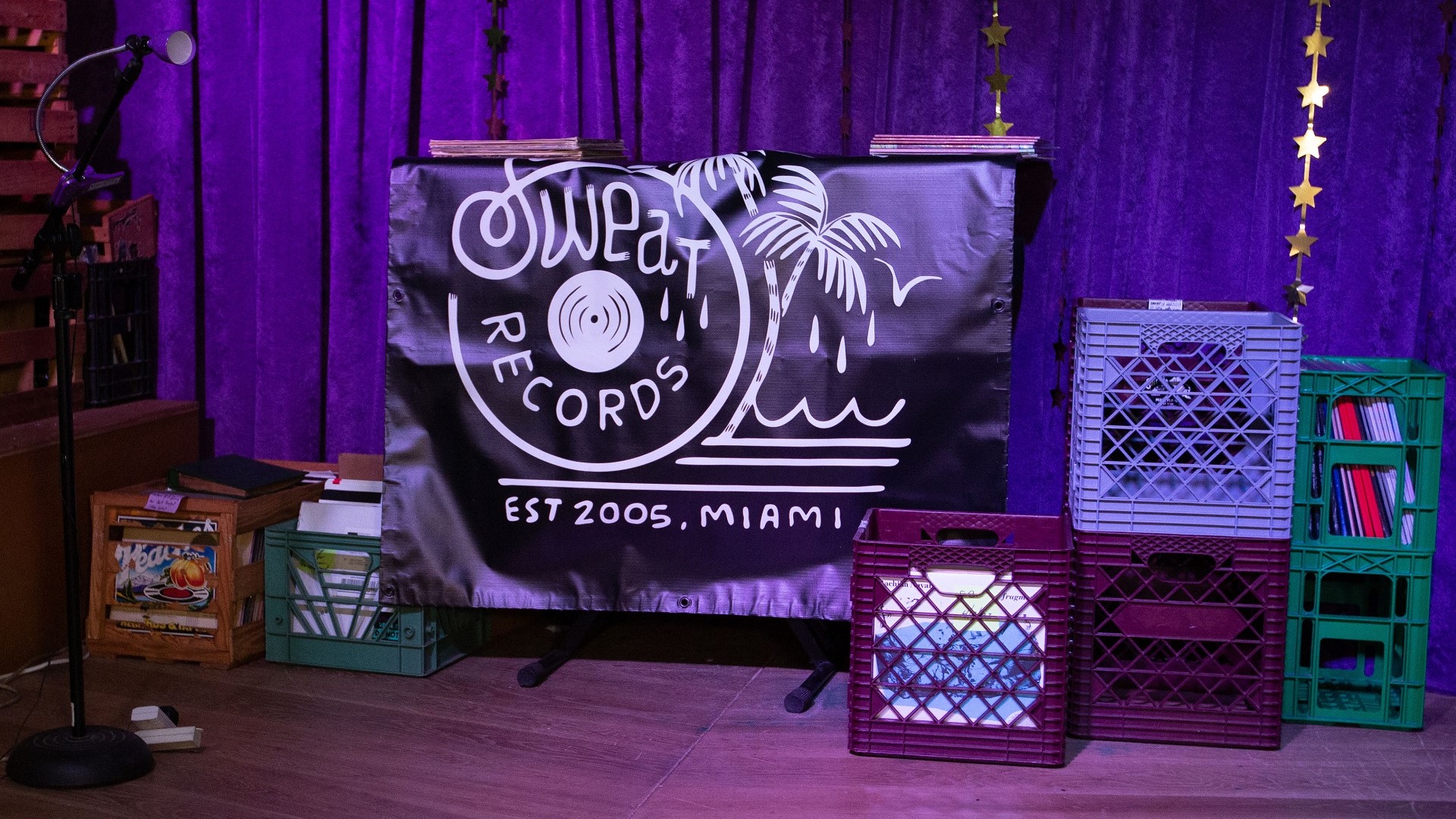
Oneika Raymond: Yeah, totally…
Oneika: Izzy is raising awareness for Latin music in Miami and beyond through Tigre Sounds, which she started at the beginning of the pandemic. Over time, she began hosting live Tigre Sessions in her Little River studio to give artists an opportunity to perform and be in community together.
Isabella Acker: And there’s a beautiful 75-minute show of an artist presenting their work. And they’re either with their own band or we create the band for them.
Oneika Raymond: Wow.
Isabella Acker: And they only have one day of rehearsal. They pull it off, we record it, and we publish it on our label, so.
Oneika Raymond: Wow. You know, it sounds as though you’re really intentional.
Oneika: To bottle up the magic that Izzy cultivates in her live Tigre Sessions, she started a record label called Tigre Den. It allows the performances to live on, and for Miami music to be distributed far and wide.
Isabella Acker: You’ll remember having been in that room, you know, and you’ll remember like, oh, I was there for that. And I think there’s something about live recordings that capture the memory. It’s like the scent, right? Of, of when you were there.
Beatriz Ayala: It’s so powerful, Tigre Sessions is one of those platforms that allows for local people in Miami to really experience the global sounds of the present and the future.
Yoli Mayor: A live Tigre Session is intimate and crowded. It is vulnerable, but it’s a party. You could hear a pin drop, but you could not hear the person next to you.
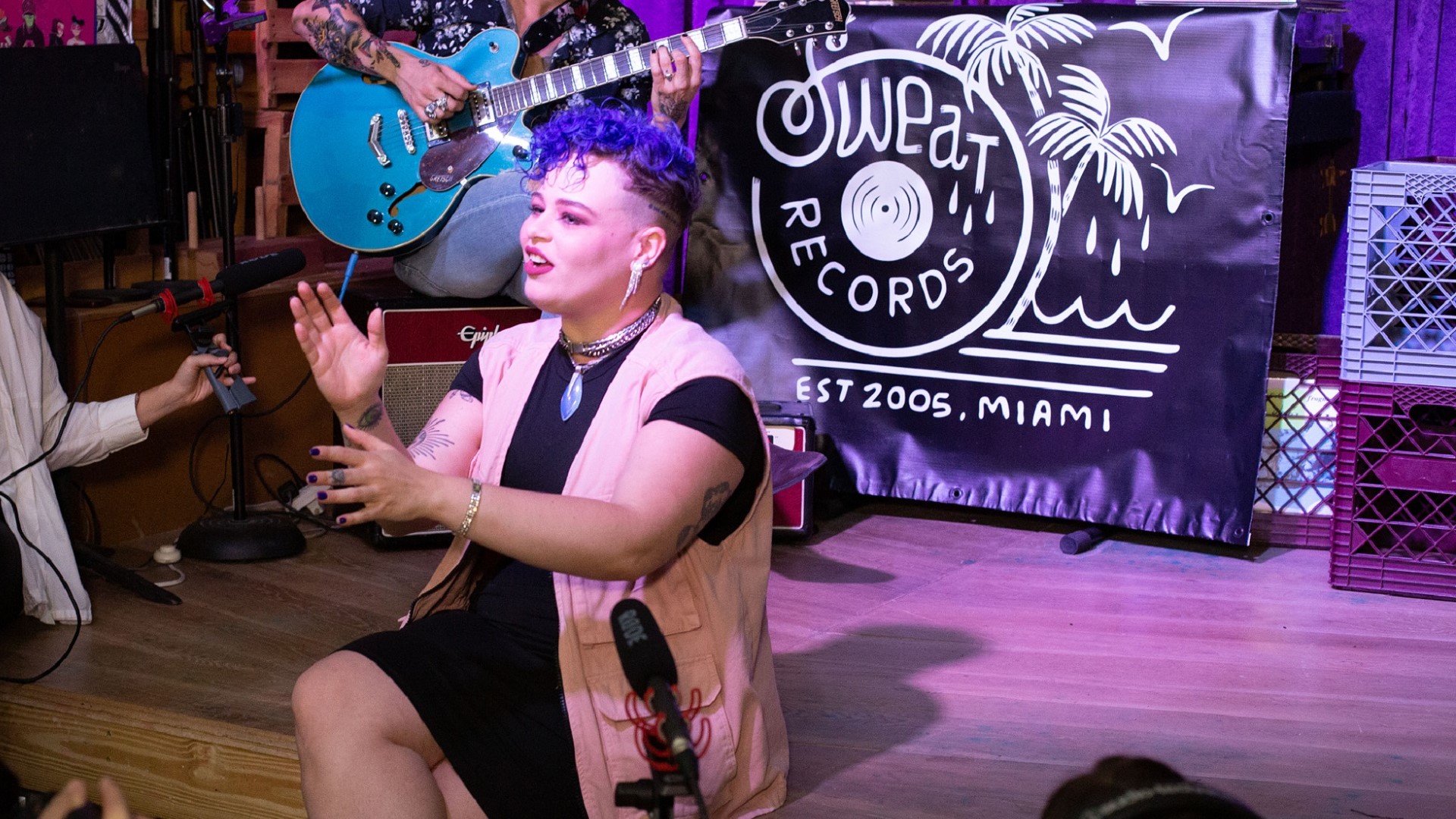
Music comes in
Oneika Raymond – VO: This is a Tigre Den recording of local DJ and singer Miluhska [Mi-loo-schka] performing her debut single, Loba — marking the launch of her solo career as a performer.
Oneika – VO: In part, it was Izzy’s mentorship that made a singing career feel possible for Miluhska. The same can be said for Izzy’s vision for more supportive, intimate spaces for live music in Miami.
Isabella Acker: I really have to, have to believe and look at Miami in its infancy because it is and its infancy. Yes. Right. And so when you see that like, wonderful things are happening, I try to champion it, I try to talk about it, I try to attend, I try to go to it because if not, they don’t exist. Right. And they close and they don’t happen.
Oneika Raymond: From what I hear, little Birdie told me that you are in, a season of expansion and we love that for you. So basically I’ve heard that a new Tigre Studios location is in the works in Little River.
Music comes in
Isabella Acker: Yeah. Little River has really. Become and been my home as, as a business owner for the last decade. It’s something that feels, uh, very authentic to my own personal journey, but also all the people who have supported us, who’ve come to our events, who’ve come to our sessions. And it only makes sense for us to really plant our own flag and our home base for our permanent studios to be in the area.
We’re just excited to continue being part of the identity of the neighborhood. Feel very grateful to be a part of that story.
Oneika Raymond: I think that the music scene is a really integral part of being here. It creates a vibe and I think it’s always easier to meet people, particularly local people, when they’re relaxed and they’re enjoying themselves. And I love that Izzy is creating and curating experiences that are more accessible in a more intimate setting, and one that breeds creativity and connection.
Driving around with Izzy really gave me some solid insights on my new home. It’s allowed me to see how big the city actually is and quite frankly, the more I explore, the more I get to love it.
Oneika: That’s all for this episode of About the Journey. Thank you to our Miami guide, Isabella Acker. Next week, we’re headed to Chicago’s Brownsville neighborhood to dig into the history of the Black Metropolis.
Shermann ‘Dilla’ Thomas: I think the name in and of itself, Bronzeville calls for inquisition, right? You know, you’ve heard about Chicago, you, heard about The Bean, you know, maybe you’re not familiar with Bronzeville. And so it’s like, what’s that?
About the Journey is produced by Marriott Bonvoy Traveler, At Will Media, and me, Oneika Raymond. Our Marriott producers are Robin Bennefield and Valerie Conners. Our AT WILL MEDIA producers are Kait Walsh, Kristy Westgard, Gale Straub and Elliot Davis. Mixing and Original theme music by Andrew Holzberger.
Learn more about Tigre Studios by following along @tigrestudios on Instagram. Thank you to Tigre Den for providing music for this episode by Miluhska and Fémina.
You can learn more about visiting Miami and how to travel more meaningfully — from Marriott Bonvoy Traveler at traveler.marriott.com.
Stay, explore and discover the unexpected with Marriott Bonvoy’s 30 plus hotel brands and over 8000 hotels in cities around the world.
And if you liked this episode of About the Journey, please be sure to rate, review, and subscribe wherever you get your podcasts.
I’m your host, Oneika Raymond. See you next time.







